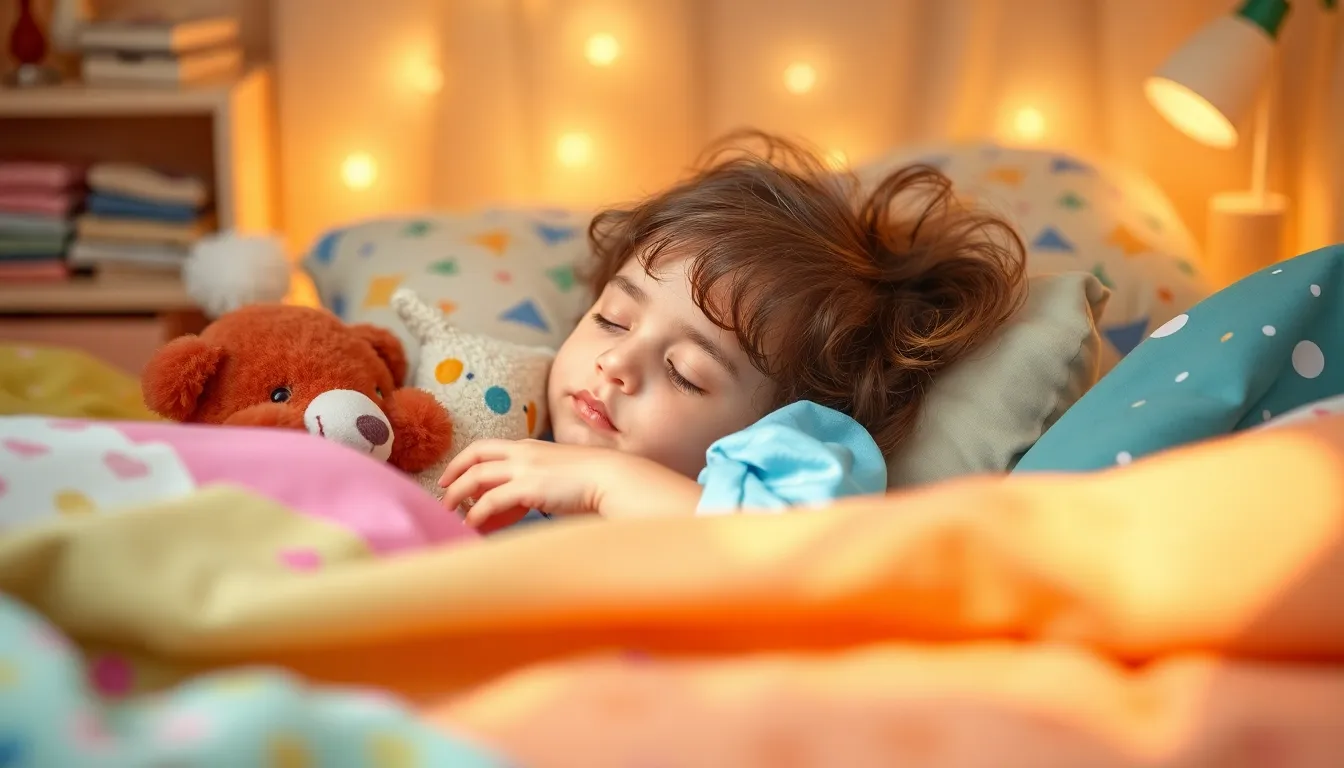Table of Contents
ToggleWhen it comes to preschoolers, sleep can feel like a mythical creature—elusive and hard to catch. Yet, establishing good sleep hygiene is crucial for those tiny tots. After all, a well-rested child is a happy child, and let’s be honest—happy kids mean happy parents!
Imagine a world where bedtime isn’t a battle but a peaceful transition into dreamland. By adopting simple sleep hygiene practices, parents can transform their little ones into sleep superheroes. From setting a cozy bedtime routine to creating a sleep-friendly environment, these strategies can work wonders. So let’s dive into the world of preschool sleep hygiene and discover how to turn those bedtime struggles into sweet dreams.
Overview of Preschool Sleep Hygiene
Establishing preschool sleep hygiene involves consistent practices that promote better sleep among young children. Parents play a crucial role in shaping these habits. Creating a bedtime routine that includes calming activities helps signal the end of the day. Reading a story or taking a warm bath can prepare a child for sleep.
Maintaining a consistent bedtime and wake time enhances the child’s internal clock. Exposure to natural light during the day supports healthy sleep patterns. Limiting screen time before bed reduces stimulation that can interfere with falling asleep. A dark, quiet environment contributes to more restful sleep.
Providing comfort with appropriate bedding and sleepwear is essential. Soft textures and a preferred stuffed animal can ease anxiety and promote a sense of security. Parents must also be mindful of the child’s diet. Avoiding heavy meals or caffeine in the hours leading up to bedtime fosters better sleep quality.
Understanding the signs of sleep deprivation is key to promoting good sleep hygiene. Irritability, mood swings, and difficulty focusing often indicate that a child isn’t getting enough rest. Educating children about the importance of sleep empowers them to take part in their sleep hygiene.
Practicing these strategies consistently leads to improved sleep habits over time. Positive changes enhance not only the child’s well-being but also the parents’ overall experience.
Importance of Sleep in Preschoolers

Sleep plays a critical role in the well-being of preschoolers. A well-rested child functions better in daily activities.
Physical Development
Quality sleep significantly impacts physical growth in preschoolers. During sleep, the body releases growth hormones that aid in the development of muscles and tissues. Sufficient rest contributes to proper immune function, helping children fend off illnesses. Additionally, strong sleep habits support healthy weight management, reducing the risk of childhood obesity. Research shows that preschoolers aged three to five typically require 10 to 13 hours of sleep daily for optimal physical health.
Cognitive Development
Cognitive development relies heavily on adequate sleep in preschoolers. Sleep enhances memory consolidation, which helps children absorb and retain new information. A well-rested brain fosters better attention span, enabling effective learning and engagement during activities. Emotional regulation improves with quality rest, leading to a more balanced mood. Studies indicate that preschoolers lacking sufficient sleep exhibit lower problem-solving skills and creativity, highlighting the necessity of prioritizing a good night’s sleep.
Common Sleep Challenges
Sleep challenges often disrupt preschoolers’ ability to rest well. Understanding these challenges helps parents address them effectively.
Sleep Disorders in Young Children
Sleep disorders can affect a child’s overall health. Conditions such as sleep apnea, insomnia, and restless legs syndrome frequently occur. Symptoms may include snoring, difficulty falling asleep, or frequent waking during the night. Parents observing these signs should consult a pediatrician for evaluation. Early intervention improves sleep quality and general well-being. Recognizing and addressing sleep disorders enables more consistent, restorative rest.
Environmental Factors Affecting Sleep
Environmental factors play a significant role in sleep quality. Light exposure, for example, can hinder the body’s natural sleep-wake cycle. Creating a dark, quiet sleeping environment enhances the chances of falling asleep quickly. Noise pollution, such as traffic or household sounds, can also disrupt sleep. Parents should consider soundproofing measures or white noise machines. The right bedding and room temperature further contribute to optimal sleep. Maintaining an atmosphere conducive to rest allows preschoolers to enjoy better sleep hygiene.
Best Practices for Promoting Sleep Hygiene
Promoting sleep hygiene for preschoolers involves simple yet effective practices that enhance their nightly rest.
Creating a Consistent Bedtime Routine
Establishing a consistent bedtime routine helps preschoolers wind down. Activities such as reading a book or enjoying a warm bath signal it’s time for sleep. Parents can set a specific time for starting these calming practices. Each evening, repeating the same order of events reinforces familiarity and comfort. Consistency allows the child’s body to recognize when it’s time to prepare for sleep. Additionally, including a favorite stuffed animal can provide security during bedtime. Soothing music or gentle lullabies can be added to enhance relaxation. Each element works together to create a peaceful transition to sleep.
Optimal Sleep Environment
Creating an optimal sleep environment is vital for encouraging quality rest. Darkness promotes melatonin production, so using blackout curtains can be beneficial. Parents should also maintain a cool room temperature, ideally between 68°F and 72°F. A quiet environment supports uninterrupted sleep; using white noise machines can mask disruptive sounds. Appropriate bedding, including comfortable pillows and soft sheets, enhances relaxation. Removing distractions such as electronic devices before bedtime helps eliminate overstimulation. Lastly, exposure to natural light during the day aids in regulating the child’s internal clock, aligning their sleep-wake cycles with day and night.
Role of Parents and Caregivers
Parents and caregivers play a crucial role in establishing and maintaining healthy sleep hygiene for preschoolers. They can set the groundwork for good sleep habits through consistency and engagement.
Encouraging Healthy Sleep Habits
Creating routines helps preschoolers understand when it’s time to wind down. Parents can establish consistent bedtimes and wake times to promote regular sleep patterns. Engaging in calming activities, like reading stories or enjoying a warm bath, signals that sleep is approaching. Additionally, limiting screen time before sleep enhances a child’s ability to relax. Providing a sleep-friendly environment, such as keeping the room dark and quiet, further supports these healthy habits. By reinforcing these practices consistently, caregivers significantly improve their children’s overall sleep quality.
Addressing Sleep Anxiety
Understanding sleep anxiety is essential for promoting restful nights. Many preschoolers experience fears that disrupt their ability to fall asleep. Parents can address these feelings by offering comfort and reassurance when bedtime arrives. Discussing worries or offering a favorite stuffed animal can provide security. If bedtime becomes a source of tension, caregivers should consider modifying the routine to make it more comforting. Creating a predictable bedtime schedule reduces anxiety as the child learns what to expect each night. Seeking professional advice, when necessary, ensures that persistent sleep anxiety is managed effectively.
Establishing good sleep hygiene for preschoolers is vital for their overall health and development. By implementing simple yet effective strategies, parents can create a peaceful bedtime routine that promotes restful sleep. Consistency in sleep schedules and a comforting sleep environment can significantly enhance a child’s ability to fall asleep and stay asleep.
Recognizing sleep challenges and addressing them proactively can lead to improved sleep quality. As parents engage in these practices, they not only support their children’s well-being but also foster a happier family dynamic. Prioritizing sleep hygiene is an investment in a child’s future, laying the foundation for better physical and cognitive development.




